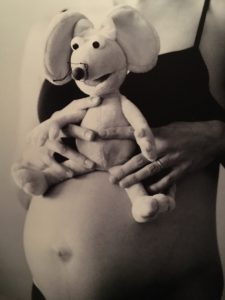As another contraction builds up, I grab the laughing gas mask with my right hand and push it tightly over my nose and mouth. I squeeze my husband’s hand with the other – his must be blue by now. I try to breathe long, slow breaths as peacefully as I can in an attempt to follow the guidebook. But I cannot help it. The pain is so violent that I almost panick. My body is tense and my breathing quick. The contraction subsides and I feel relieved to have survived another one. How much longer? I have been sitting on my knees on the bed for some time now, hoping that gravity can aid a little. Hours have gone by since I was fully dilated. They encourage me to eat something, but the yoghurt and the blueberry soup remain untouched on the bedside table. Once in awhile, the midwives check baby’s heart rate and communicate with me – encouraging me and asking questions about my pain level. The subcutaneous sterile water injections offer no relief. Epidural is something I never wanted for my birth. I try to trust my body and their medical judgement on the progress of my labor. Soon, very soon we will get to meet our son.
The pregnancy was a textbook case. No complications, little nausea, plenty of energy and joyous anticipation. I worked full-time up to two weeks before due date. Naturally, I wanted to save up as much parental leave as possible to use after our son was born. I felt so lucky to live in a country which such generous benefits for new parents. My friends in the Netherlands only had three months at home with their newborns, at best. My sister-in-law in the U.S. had six weeks, unpaid. When I told my manager about my pregnancy, he stood up, gave me a big hug and congratulated me. At the annual employee evaluations a few months later, he gave me a significant pay rise. I recruited a temporary (year-long!) replacement for my tasks within the company and we were all good to go.
Labor pains start early in the morning on due date, a Saturday. I sleep through most of the rest of the night and my husband and I get up feeling excited. After breakfast, we go for a morning walk and do some reading. After a hearty pasta lunch, I settle down on the couch to labor through more serious contractions. My husband faithfully times them whilst rubbing my back. At the end of the afternoon, contractions are close enough to check into the hospital, but the nearby hospital of my choice has no room for us! This is what every woman in Sweden dreads… After a few minutes, we are referred to another hospital 25 minutes south from us. My husband orders a taxi and we are on our way. By the sound of my labor, the driver probably thinks I am going to give birth right there and then. A ride has never felt this long. As my water breaks, I gratefully notice that the seats are leather.
Fast forward to the early hours of Sunday morning. There has been a change of shift and I am introduced to a midwife-in-training. At this point, I am so focused on getting that baby out of me, I stop caring about details such as the competence of the people assisting my delivery… Almost 22 hours after the first contraction and I know the culmination is near. All spotlights are aimed between my legs, a number of people is standing around, ready to step in if necessary, steady encouragement reaches my ears. One more strong contraction, I hold my breath and push with all my might and… baby shoots out like a rocket, face up. We have a star gazer. Born on a Sunday. His name is Asher.
Asher has difficulties breastfeeding. The long labor had taken its toll and he has no energy to suck. The nurses show me how to extract milk and cup-feed him. Eventually he catches on. Two weeks later however, I am back in the hospital with chopped nipples and high fever. I am given antibiotics for the infection. I visit the lactation consultants at the hospital several times. A kind but stern, older Finnish woman shows me the tricks of the trade. Without her help, I could have never continued to breastfeed.
Asher happily nursed for a year. At that point, I was three months pregnant with our second child. During a routine check-up, the midwife asked me whether I had any questions about my first birth. It was only then that I learned about “occiput posterior” (OP) babies causing long and painful deliveries. I felt appreciation for the midwives that chose to guide me safely through a vaginal birth, despite the potential risks. Knowing that the chance of having another OP-baby were low made me hopeful for an easier second birthing experience. And indeed, our daughter was born after mere four hours of contractions, most of which I calmly breathed through at home.

Not realizing that the birth is so near, we only barely make it into the hospital in time, leaving our sleeping toddler in the caring hands of a neighbor. The first midwife that meets us has a trained ear: “I can hear that you are wanting to push. Don´t you dare to do it here, let´s get you safely into a delivery room!” Once settled into that room, I am offered laughing gas and I get onto all fours. When baby’s head comes out, I swear out loud. In Swedish! (I never even swear in my mother tongue…the things you learn about yourself in labor…) Minutes later, our beautiful little girl lays on my chest, looking at me with big, curious eyes. Born on a Sunday. Her name is Livia.